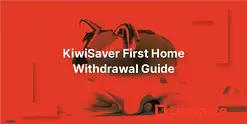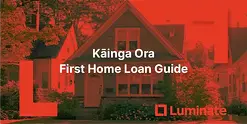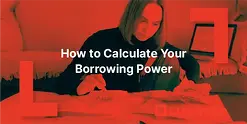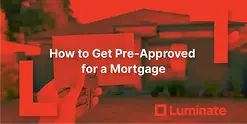Who Qualifies as a First-Home Buyer in NZ – 2025 Guide
 By
Trent Bradley
·
18 minute read
By
Trent Bradley
·
18 minute read
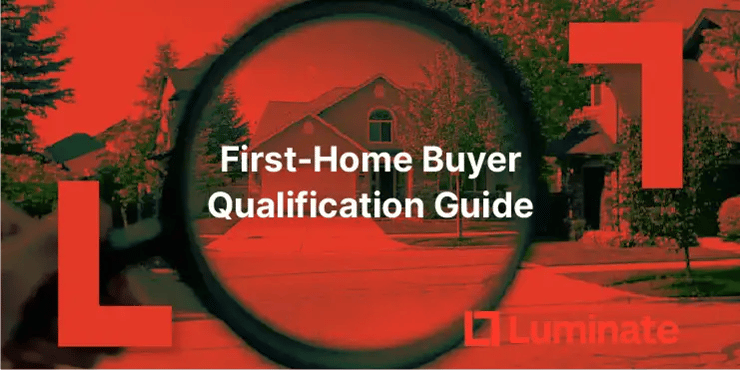
Buying your first home is an exciting milestone, but before you dive into property listings and open homes, you need to understand one crucial question: Do you actually qualify as a first-home buyer?
A first-home buyer in New Zealand is someone who has never owned residential property anywhere in the world, including through trusts or companies. You must intend to live in the property for at least 6 months. Those who previously owned property may qualify as "second-chance buyers" if they're now in a similar financial position to first-home buyers.
Table of Contents
- What Does "First-Home Buyer" Really Mean in New Zealand?
- Who Qualifies as a First-Home Buyer? Essential Criteria
- Am I a First-Home Buyer? Quick Decision Tree
- Understanding Second-Chance Buyer Status
- Property Types and Situations: What Counts as Previous Ownership?
- Common First-Home Buyer Myths Debunked
- Why First-Home Buyer Status Matters
- How to Confirm Your First-Home Buyer Eligibility
- What If You Don't Qualify as a First-Home Buyer?
- Frequently Asked Questions About First-Home Buyer Status in NZ
- Final Thoughts
Key Takeaways
- A first-home buyer in New Zealand has never owned any residential property anywhere in the world—including through trusts, companies, freehold, leasehold, cross-lease arrangements, investment properties, bare land, or overseas holdings—and must intend to live in the property as their primary residence for at least 6 months after settlement
- Previous property ownership of any kind disqualifies you from standard first-home buyer benefits including KiwiSaver withdrawal (your balance minus $1,000) and Kāinga Ora First Home Loan (5% deposit government-backed scheme), regardless of whether you lived in the property, how briefly you owned it, or how long ago the ownership occurred
- Second-chance buyer provisions offer a pathway for those who previously owned property but are now in a similar financial position to first-home buyers—common scenarios include relationship property settlements, bankruptcy, or major life changes—with Kāinga Ora assessing applications individually based on time elapsed (typically 3+ years), current asset position, circumstances of property loss, and genuine need for support
- Investment property ownership counts as previous ownership even if you never lived in a home yourself—the term "first-home buyer" essentially means "first-property buyer" in New Zealand's definition, with any residential property ownership anywhere at any time disqualifying you from accessing first-home buyer schemes and government support
- Inheritance situations vary critically by whether you became the legal owner—inheriting property and taking title disqualifies you even if you immediately sold it, but inheriting money (cash proceeds after the estate sold property) doesn't count as property ownership since you never held title yourself
- Buying with a partner who previously owned property creates complications—for KiwiSaver withdrawal the genuine first-home buyer may still withdraw their own balance while the previous owner cannot, but for First Home Loan joint applicants typically both need to be first-home buyers or approved second-chance buyers
- Trust and company ownership requires individual assessment—passive beneficiary status without control or benefit may still allow first-home buyer qualification, but trustees with beneficial interest, settlors with control, or directors/major shareholders in companies owning residential property likely don't qualify, making full disclosure and legal advice essential for these complex situations
Your first-home buyer status isn't just a label—it directly determines your eligibility for valuable government schemes and financial support, including:
- KiwiSaver First-Home Withdrawal (accessing most of your KiwiSaver balance)
- Kāinga Ora First Home Loan (buying with as little as 5% deposit)
- Bank first-home buyer programs (preferential rates, cashbacks, special lending criteria)
Getting this wrong can derail your entire home buying journey, so understanding the definition and requirements is essential. This comprehensive guide explains exactly what it means to be a first-home buyer in New Zealand, who qualifies, special provisions for second-chance buyers, and how to confirm your eligibility.
What Does "First-Home Buyer" Really Mean in New Zealand?
The definition seems straightforward at first: someone buying their first home. However, the official criteria are more nuanced and stricter than many people expect.
The Official Definition
A first-home buyer in New Zealand is someone who has:
- Never owned any residential property anywhere in the world
- Never held legal interest in any property, including freehold, leasehold, or cross-lease
- Never owned property through trusts or companies where they had beneficial ownership or control
- Never owned investment property, land, or any other property type that could be considered residential
And who:
- Intends to live in the property as their primary residence
- Plans to occupy the home for at least 6 months following settlement
- Is purchasing for personal use, not as an investment or rental
This definition applies consistently across:
- KiwiSaver first-home withdrawal applications
- Kāinga Ora First Home Loan assessments
- Most bank first-home buyer lending programs
- Government support schemes
Why the Definition Is So Strict
The government and lenders designed these criteria to ensure support reaches people who genuinely need help entering the property market for the first time. The strict definition prevents:
- Investors from accessing first-home buyer benefits while building property portfolios
- People upgrading or purchasing additional properties from claiming first-home buyer status
- Abuse of government-backed schemes by those who don't need the support
While this strictness can be frustrating if you're in an edge case, it ensures the limited resources available for first-home buyer support reach those who need them most.
Who Qualifies as a First-Home Buyer? Essential Criteria
To qualify under the standard first-home buyer definition, you must meet all of the following requirements:
1. No Previous Property Ownership Anywhere
You have never owned:
- Any residential property in New Zealand
- Any property overseas (in any country)
- Investment properties
- Bare land with residential potential
- Holiday homes or baches
- Property through a trust where you had beneficial interest
- Property through a company where you had control or significant shareholding
- Part ownership or shared ownership of any property
Even these situations disqualify you:
- Owning an investment property first (even if you've never lived in a home you owned)
- Brief ownership before selling
- Ownership decades ago
- Ownership in another country before moving to NZ
- Ownership lost through bankruptcy or foreclosure (though you may qualify as second-chance buyer)
The key principle: If you've ever held legal title or beneficial ownership of residential property anywhere, at any time, you don't qualify under the standard first-home buyer definition.
2. Purchasing to Live In (Owner-Occupied)
You must:
- Intend to live in the property as your primary residence
- Move into the property within a reasonable timeframe (typically 6 months) after settlement
- Reside there for at least 6 months continuously
You cannot:
- Purchase as an investment property to rent out
- Buy for a family member to live in while you live elsewhere
- Use it primarily as a holiday home while residing elsewhere
- Immediately flip the property for profit
This requirement ensures the schemes support people seeking housing security, not investment opportunities.
3. Meeting Program-Specific Requirements
Beyond the general first-home buyer definition, specific schemes have additional criteria:
For KiwiSaver First-Home Withdrawal:
- Contributed to KiwiSaver for at least 3 years
- Property price must be within KiwiSaver price caps (if applicable)
- Must be purchasing (not building) unless specific exemptions apply
For Kāinga Ora First Home Loan:
- Income under $95,000 (single) or $150,000 (couple)
- Property price under regional price cap
- New Zealand citizen, permanent resident, or indefinite resident visa
- Meet participating lender's credit and serviceability requirements
For bank first-home buyer programs:
- Each bank sets their own additional criteria
- May include income requirements, employment stability, credit score minimums
- Some offer better deals to first-home buyers but don't require strict adherence to the government definition
Am I a First-Home Buyer? Quick Decision Tree
Follow this flowchart to determine your status:
Question 1: Have you ever owned any property anywhere in the world?
→ No: Continue to Question 2
→ Yes: Go to Question 3
Question 2: Do you intend to live in the property you're buying?
→ Yes, as my primary residence for 6+ months: ✅ You ARE a first-home buyer
→ No, as an investment or rental: ❌ You do NOT qualify
Question 3: Do you currently still own that property?
→ Yes: ❌ You do NOT qualify as a first-home buyer
→ No, I no longer own it: Continue to Question 4
Question 4: Are you in a similar financial position to a first-home buyer?
→ Yes, due to relationship settlement/bankruptcy/major life change: Continue to Question 5
→ No, I have substantial assets: ❌ You likely do NOT qualify
Question 5: Has it been at least 3 years since you owned property?
→ Yes: 🔶 You MAY qualify as a second-chance buyer (requires Kāinga Ora assessment)
→ No: 🔶 You MAY still qualify as a second-chance buyer (case-by-case assessment)
Understanding Second-Chance Buyer Status
If you previously owned property but no longer do, you're not automatically excluded from first-home buyer benefits. New Zealand's second-chance buyer provisions offer a potential pathway back to homeownership support.
What Is a Second-Chance Buyer?
A second-chance buyer is someone who:
- Previously owned residential property (in NZ or overseas)
- No longer owns any property
- Is now in a financial position similar to a genuine first-home buyer
- Needs support to re-enter the property market
This status recognizes that life circumstances can fundamentally change a person's financial situation, making government support appropriate even though they once owned property.
Common Second-Chance Buyer Scenarios
Relationship Property Settlements
When relationships end, one partner often retains the family home while the other leaves with minimal assets. The departing partner may have their name removed from the title and receive a settlement that, while legally fair, doesn't provide enough to purchase another property independently.
Example: Emma and James owned a $900,000 home together. After separation, James kept the house and Emma received $150,000 in settlement. After legal fees ($20,000), moving costs, setting up a new rental, and living expenses over two years, Emma has $35,000 in savings. She earns $75,000 annually but can't afford a house without support. She may qualify as a second-chance buyer.
Bankruptcy or Significant Financial Hardship
Business failures, major medical expenses, or other financial catastrophes can result in bankruptcy and property loss. After discharge from bankruptcy and financial rehabilitation, these individuals may qualify for second-chance buyer assessment.
Example: David owned a $650,000 home but his business collapsed during economic downturn. He declared bankruptcy, lost his home, and spent 4 years rebuilding. He now has stable employment earning $85,000, good credit, and $40,000 saved for deposit—but no other significant assets. He may qualify as a second-chance buyer.
Major Life Events
Serious illness, disability, caring for family members, or other major life disruptions that resulted in property loss and financial hardship may warrant second-chance buyer consideration.
Example: Sarah owned a $550,000 property but had to sell it to fund medical treatment for a serious illness. After recovery, she returned to work but her savings were depleted. Five years later, she's financially stable but without property assets. She may qualify as a second-chance buyer.
The Assessment Process
Kāinga Ora evaluates second-chance buyer applications based on:
Time elapsed since property ownership:
- Generally, 3+ years since owning property strengthens your case
- Shorter periods may still qualify depending on circumstances
- Very recent ownership (less than 1 year) unlikely to qualify
Current asset position:
- Total net worth compared to typical first-home buyers
- Whether your asset base is genuinely comparable to someone who never owned property
- Consideration of reasonable life circumstances that depleted assets
Income and employment:
- Current earning capacity
- Employment stability
- Whether you can service a mortgage but simply lack deposit/equity
Circumstances of property loss:
- Involuntary loss (separation, bankruptcy) vs. voluntary sale
- Whether the loss was due to circumstances largely beyond your control
- Evidence of genuine financial hardship
Genuine need for support:
- Whether you truly need government backing to re-enter homeownership
- Whether you could reasonably purchase without assistance within a short timeframe
- Your overall financial trajectory
How to Apply as a Second-Chance Buyer
Step 1: Gather comprehensive documentation
Evidence of previous ownership:
- Old property titles or settlement statements
- Sale documents showing when you sold
- Relationship property settlement agreements (if applicable)
Proof of circumstances:
- Divorce or separation papers
- Bankruptcy discharge documents
- Medical records or financial hardship evidence
- Any relevant legal documents
Current financial position:
- Last 6 months of bank statements
- Current payslips and employment contract
- Complete asset and liability statement
- Credit report
- Savings history showing deposit accumulation
Step 2: Contact Kāinga Ora directly
Call or email Kāinga Ora to request a second-chance buyer assessment application form. Explain your situation briefly and ask what specific documentation they require.
Contact details:
- Phone: 0800 801 601
- Website: kaingaora.govt.nz
Step 3: Complete the application thoroughly
Fill out all required forms completely and honestly. Provide:
- Detailed explanation of your circumstances
- Timeline of property ownership and loss
- Current financial situation
- Why you need support to purchase again
Step 4: Submit with supporting documents
Send your completed application with all documentation. Ensure everything is clearly labeled and organized.
Step 5: Wait for assessment
Kāinga Ora reviews each case individually. Processing typically takes 2-4 weeks but can be longer during busy periods or if additional information is needed.
Step 6: Receive written determination
You'll receive a formal decision letter stating whether you qualify as a second-chance buyer. If approved, this determination allows you to access:
- Kāinga Ora First Home Loan
- KiwiSaver first-home withdrawal (subject to KiwiSaver scheme rules)
- Other first-home buyer support programs
If denied: The letter should explain why you didn't qualify. You may be able to reapply after addressing the concerns or after more time has passed.
Property Types and Situations: What Counts as Previous Ownership?
Understanding what counts (and doesn't count) as previous ownership helps clarify your status:
| Situation | Counts as Previous Ownership? | Explanation |
|---|---|---|
| Owned house in NZ, lived in it | ✅ Yes | Standard residential property ownership |
| Owned investment property in NZ | ✅ Yes | Any residential property ownership counts |
| Owned apartment overseas | ✅ Yes | Property anywhere in the world counts |
| Owned residential bare land | ✅ Yes | Land with residential potential counts |
| Owned commercial land only | ❌ Probably not | Pure commercial typically doesn't count |
| Inherited house, became legal owner | ✅ Yes | Legal ownership counts even if temporary |
| Inherited money (not property title) | ❌ No | If you received cash proceeds, not title |
| Partner owned before, buying together | ⚠️ Complicated | Partner doesn't qualify; you might for KiwiSaver only |
| Beneficiary of trust (no control) | ❌ Probably not | Passive benefit without ownership interest |
| Trustee with beneficial interest | ✅ Probably yes | If you controlled/benefited from property |
| Company director owning property | ⚠️ Maybe | Depends on shareholding and control level |
| Owned bach/holiday home | ✅ Yes | All residential property counts |
| Part-owner with parents | ✅ Yes | Any ownership share counts |
| Name on title as favor/nominee | ⚠️ Complex | Depends on beneficial ownership; need legal proof |
| Owned and sold 20 years ago | ✅ Yes | Time elapsed doesn't change ownership history |
| Lost property in foreclosure | ✅ Yes | But may qualify as second-chance buyer |
Common First-Home Buyer Myths Debunked
Myth 1: "I only owned investment property, never a home I lived in, so I'm still a first-home buyer"
Reality: The term "first-home buyer" is somewhat misleading. It really means "first-property buyer"—any property ownership disqualifies you, regardless of whether you lived there.
Myth 2: "I owned property briefly before selling, so it doesn't count"
Reality: Even owning property for a few weeks or months counts as ownership. The length of time you owned it is irrelevant to your first-home buyer status.
Myth 3: "The property was in a trust, so it wasn't really mine"
Reality: If you had beneficial interest, control, or received benefit from a trust-owned property, you likely don't qualify as a first-home buyer. Each trust situation is assessed individually, but passive beneficiary status is different from beneficial ownership.
Myth 4: "I inherited my parents' house but immediately sold it, so I'm still a first-home buyer"
Reality: If you became the legal owner through inheritance—even temporarily before selling—this counts as property ownership. The fact that you sold it quickly doesn't erase your ownership history.
Myth 5: "My ex got the house in our separation, so I'm a first-home buyer again"
Reality: You're not a standard first-home buyer, but you may qualify as a second-chance buyer. This requires a separate application and assessment by Kāinga Ora based on your current financial position.
Myth 6: "I can buy an investment property first and still get first-home buyer benefits later for my actual home"
Reality: Absolutely not. Once you own any property—investment or otherwise—you can never access first-home buyer benefits, even if you subsequently want to buy your first owner-occupied home.
Myth 7: "If I buy with my partner who's a first-home buyer, we both get all the benefits"
Reality: Generally no. If one person has previously owned property:
- They typically cannot withdraw their KiwiSaver for the purchase
- Joint applications for First Home Loan usually require both parties to be first-home buyers or second-chance buyers
- The genuine first-home buyer might be able to access some benefits individually
Myth 8: "It was so long ago that it doesn't matter anymore"
Reality: There's no statute of limitations on property ownership. Whether you owned property 2 years ago or 20 years ago, your ownership history remains unless you qualify as a second-chance buyer.
Special Considerations and Edge Cases
Buying with a Partner Who Previously Owned Property
This common scenario creates complexity:
For KiwiSaver withdrawal:
- The partner who never owned property may withdraw their own KiwiSaver
- The partner who previously owned typically cannot withdraw
- Each KiwiSaver provider assesses individually
For Kāinga Ora First Home Loan:
- Joint applicants typically both need to be first-home buyers or second-chance buyers
- If one doesn't qualify, you may not be able to use the First Home Loan
- Individual applications (one person buying alone) might be possible but complicate ownership structure
For bank lending:
- Banks assess each applicant's circumstances
- The previous owner may face stricter lending criteria
- Some first-home buyer discounts might not apply
Strategy: Consider having the genuine first-home buyer purchase individually (if they can service the loan alone) or both parties applying as co-buyers without First Home Loan if one doesn't qualify.
Trust and Company Ownership
The complexity: Property owned through trusts or companies creates ambiguity about beneficial ownership.
Trust scenarios:
Discretionary beneficiary with no control: If you were merely a potential beneficiary of a family trust that owned property, but you had no control, received no benefit, and had no ownership interest, you might still qualify as a first-home buyer. Legal advice and documentation required.
Trustee with beneficial interest: If you were a trustee and also benefited from the trust property (lived in it, received income from it, or had control over it), you likely don't qualify as a first-home buyer.
Settlor or appointor of trust: If you established or controlled a trust that owned property, you likely had sufficient beneficial ownership to disqualify you.
Company scenarios:
Minor shareholder in large company: Owning a small number of shares in a publicly listed company that owns property wouldn't typically count as property ownership.
Director/major shareholder of family company: If you were a director or significant shareholder (e.g., 25%+) in a company that owned residential property where you had control or benefit, you likely don't qualify.
Each case is unique. If you have trust or company ownership in your history, seek legal advice and disclose fully to Kāinga Ora or your KiwiSaver provider for a definitive ruling.
Inheritance Situations
Scenario 1: Inherited property and became legal owner
- Even if you immediately sold it, you owned property
- You don't qualify as first-home buyer under standard definition
- May qualify as second-chance buyer depending on circumstances
Scenario 2: Inherited money (property was sold by estate)
- If the estate sold the property and you received cash proceeds, you never owned the property itself
- You still qualify as a first-home buyer ✓
Scenario 3: Property held in trust after death
- If the property went into a testamentary trust where you're a beneficiary but not owner, you might still qualify
- Depends on the trust structure and your interest level
The key distinction: Did you ever hold legal title to the property, or did you only receive financial benefit?
Separation and Relationship Property
Common scenario: You co-owned the family home, separated, and your ex-partner retained the property while you received a cash settlement or other assets.
Your status:
- You're not a first-home buyer under the standard definition (you previously owned property)
- You very likely qualify as a second-chance buyer if:
- Your settlement didn't leave you with substantial assets
- You're now in a similar financial position to first-home buyers
- Reasonable time has passed (typically 3+ years helps)
Application process: You'll need to apply to Kāinga Ora with:
- Relationship property agreement or court orders
- Evidence of settlement received
- Current financial position documentation
- Explanation of how settlement funds were used
Most people in this situation who apply thoughtfully with good documentation receive second-chance buyer approval.
Why First-Home Buyer Status Matters
Understanding why this distinction is so important helps motivate you to get clarity on your status early:
Access to KiwiSaver Withdrawal
First-home buyers can:
- Withdraw their entire KiwiSaver balance minus $1,000
- Use this significant sum toward their deposit
- Potentially access tens of thousands of dollars they've accumulated
Non-first-home buyers:
- Cannot access KiwiSaver for subsequent property purchases
- Must fund deposits entirely from other sources
- Miss out on what's often the largest component of deposit savings
The impact: For someone with $45,000 in KiwiSaver, being able to withdraw $44,000 can be the difference between buying now versus waiting another 3-5 years to save that amount independently.
Eligibility for Kāinga Ora First Home Loan
First-home buyers (and second-chance buyers) can:
- Purchase with as little as 5% deposit
- Access government-backed lending that reduces lender risk
- Enter the market years sooner than with standard 20% deposit requirement
Non-first-home buyers:
- Need minimum 10-20% deposit for standard lending
- Face much higher deposit hurdles
- May not qualify for low-deposit lending at all depending on circumstances
The impact: Being able to buy a $650,000 home with $32,500 (5%) versus needing $130,000 (20%) is transformative for most people's timelines.
Bank First-Home Buyer Programs
Many banks offer enhanced support for first-home buyers:
Possible benefits:
- Lower interest rates or rate discounts
- Cashback contributions ($2,000-$5,000)
- Reduced fees or fee waivers
- More flexible lending criteria
- Dedicated first-home buyer specialists
The value: Even a 0.25% lower interest rate on a $600,000 loan saves approximately $1,500 annually—$7,500 over a typical 5-year fixed term.
Overall Borrowing Capacity
First-home buyer status often results in:
- More favorable assessment of your application
- Greater willingness from lenders to work with you
- Access to programs specifically designed for first-time purchasers
- Better overall lending terms
How to Confirm Your First-Home Buyer Eligibility
Don't assume—verify your status through these steps:
Step 1: Conduct Honest Self-Assessment
Ask yourself these questions and answer truthfully:
- Have I ever owned any property anywhere in the world?
- Have I ever been listed on a property title, even briefly?
- Have I ever had beneficial ownership through a trust or company?
- Did I inherit property and become the legal owner?
- Have I owned investment property, land, or any residential asset?
If you answered "yes" to any of these, you're not a first-home buyer under the standard definition (but may qualify as second-chance buyer).
Step 2: Request Title Searches (If Unsure)
If you're uncertain about past ownership, ask your lawyer or conveyancer to:
- Conduct title searches on your name
- Check historical property records
- Verify whether you've been listed on any titles
Cost: Usually $20-$50 per search, well worth the certainty.
Step 3: Contact Your KiwiSaver Provider
If you plan to use KiwiSaver:
- Call your provider's customer service line
- Explain your situation honestly
- Ask whether you meet their first-home buyer criteria
- Request information about the application process
Different providers may have slightly different processes, so getting provider-specific information is valuable.
Step 4: Reach Out to Kāinga Ora (If Applicable)
If you're considering the First Home Loan:
- Contact Kāinga Ora directly with questions
- If you're a potential second-chance buyer, request an assessment application
- Get written confirmation of your eligibility status before proceeding
Kāinga Ora contact:
- Phone: 0800 801 601
- Website: kaingaora.govt.nz
Step 5: Consult a Mortgage Adviser Early
Engage a mortgage adviser who specializes in first-home buyers:
- They understand the definitions and criteria intimately
- They can advise on your specific situation
- They may have seen similar cases and know the likely outcome
- They can help you navigate second-chance buyer applications if needed
Get clarity before you start house hunting. There's nothing worse than finding your dream home, making an offer, and then discovering you don't qualify for the support you were counting on.
What If You Don't Qualify as a First-Home Buyer?
Not qualifying doesn't mean you can't buy a home—it just means you'll use different pathways:
Alternative Strategies
Standard bank lending:
- Save a larger deposit (10-20%)
- Apply through traditional lending channels
- Accept that you won't access first-home buyer specific benefits
Build equity in other ways:
- Consider purchasing with family members who can contribute
- Look at more affordable areas or property types
- Save aggressively to reach deposit requirements faster
Second-chance buyer application:
- If you previously owned property, explore whether you qualify
- The assessment is case-by-case and many people succeed
Non-bank lenders:
- May have more flexible criteria
- Can sometimes lend with lower deposits (though at higher rates)
- Consider if you don't qualify for bank lending
The Silver Lining
If you previously owned property, even though you can't access first-home buyer schemes, you have:
- Experience with homeownership and its responsibilities
- Knowledge of the property market and buying process
- Potentially stronger financial literacy from previous property ownership
- Possibly better credit history if you managed previous mortgage well
These advantages can help you navigate the purchase process more confidently and secure favorable lending terms even without first-home buyer status.
Frequently Asked Questions About First-Home Buyer Status in NZ
What is the official definition of a first-home buyer in New Zealand?
A first-home buyer in New Zealand is someone who has never owned any residential property, land, or legal interest in property anywhere in the world. This includes freehold, leasehold, cross-lease properties, and ownership through trusts or companies. You must also intend to live in the property as your primary residence.
Can I be a first-home buyer if I owned property overseas?
No. If you've owned residential property anywhere in the world—not just New Zealand—you don't qualify as a first-home buyer under standard definitions. This applies to KiwiSaver withdrawal, First Home Loan, and most bank first-home buyer programs.
Does inheriting a property disqualify me as a first-home buyer?
Generally yes, if you inherited property and became the legal owner, even if you never lived in it or quickly sold it. However, if you only inherited money (not property itself) or the property was held in a trust where you weren't the legal owner, you may still qualify. Each situation is assessed individually.
What if I owned an investment property but never a home I lived in?
You still don't qualify as a first-home buyer. The definition includes any property ownership—residential, investment, land, or commercial—regardless of whether you lived in it. The schemes are designed for people who have never owned any property at all.
Can I qualify as a second-chance buyer in New Zealand?
Yes, if you previously owned property but are now in a similar financial position to a first-home buyer. Common scenarios include relationship property settlements, bankruptcy, or major life changes that left you without assets. Kāinga Ora assesses second-chance buyer applications case-by-case based on your current financial situation.
Does buying with a partner who owned property before affect my eligibility?
Yes. If you're buying jointly with someone who has owned property before, you're both assessed. For KiwiSaver withdrawal, the person who previously owned property won't qualify to withdraw, but the genuine first-home buyer might. For First Home Loan, joint applicants typically both need to be first-home buyers or second-chance buyers.
How long do I need to live in the property to maintain first-home buyer status?
You must intend to live in the property as your primary residence for at least 6 months after settlement. This is a requirement for both KiwiSaver withdrawal and First Home Loan schemes. Renting it out immediately or using it as an investment would breach these conditions.
How do I prove I'm a first-home buyer?
You'll typically need to provide a statutory declaration confirming you've never owned property, along with supporting documents. Your lawyer may conduct title searches to verify no previous ownership. For second-chance buyers, you'll need detailed financial documentation showing your current position.
Final Thoughts
Understanding whether you qualify as a first-home buyer in New Zealand is one of the most critical steps in your property journey. This status determines:
- Your access to KiwiSaver funds
- Your eligibility for low-deposit lending through First Home Loan
- Your ability to use various bank first-home buyer programs
- Your overall path to homeownership
The definition is strict for good reason—to ensure limited government support reaches those who genuinely need it most. While this can be frustrating if you're in an edge case, it protects the integrity of these valuable schemes.
Key takeaways:
✓ Never owned property anywhere = first-home buyer (if you'll live in it)
✓ Previously owned but lost through life circumstances = potentially second-chance buyer
✓ Currently own or recently owned = not eligible for first-home buyer benefits
✓ Any property ownership ever = standard first-home buyer status doesn't apply
If you're unsure about your status:
- Don't guess or assume
- Get professional advice early
- Request official determinations from Kāinga Ora or your KiwiSaver provider
- Understand your options before committing to property searches
Even if you don't qualify as a first-home buyer, homeownership is still achievable—you'll just follow a different pathway. And if you do qualify, understanding exactly what that means empowers you to maximize every available benefit and support.
At Luminate Financial Group, we work with both first-home buyers and second-chance buyers every day. We understand the definitions, eligibility criteria, and application processes intimately. More importantly, we help you navigate these complexities and develop a clear strategy tailored to your specific situation.
Want to Check Your Eligibility and Create Your Home Buying Strategy?
Book a free First-Home Buyer Assessment with Luminate.
In this consultation, we'll:
- Review your property ownership history
- Determine your first-home buyer or second-chance buyer status
- Explain exactly what benefits you can access
- Check your KiwiSaver eligibility and available balance
- Assess your borrowing capacity and deposit requirements
- Identify the best lending pathway for your situation
- Help with second-chance buyer applications if applicable
- Create a clear timeline and action plan
Don't let confusion about your eligibility slow your progress toward homeownership. Get clarity, get expert guidance, and get moving toward your first home.
Contact Luminate Financial Group:
📞 Call 0800 333 400
📧 Email askus@luminate.co.nz
🌐 Visit luminate.co.nz
Your path to homeownership starts with understanding where you stand. Let's figure it out together.

Trent Bradley
Trent Bradley is a New Zealand financial advisor specializing in property-backed finance and investment consulting. With over 26 years of experience running his mortgage broking business, he has helped wholesale investors access high-yield property-backed loan opportunities. For the past 12 years, Trent has led Luminate Finance, a New Zealand finance company dedicated to connecting investors with secure property investment solutions.
















